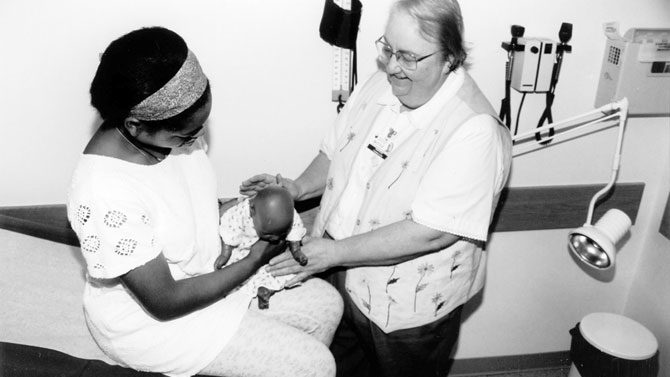Nurses who worked in labor and delivery at Athens General Hospital in the late 1970s knew Elizabeth “Bettye†Dann before they shared a shift with her. They knew, for example, that during quiet spells, Bettye walked over to the newborn nursery to rock a tiny baby she’d delivered hours before. They knew that Bettye’s mere presence calmed the most panicked mothers- and fathers-to-be. The nurses understood, too, that when Bettye asked a question, she expected a straight answer.
Standing five feet, seven inches, clear-eyed, confident of her clinical skills, Bettye approached the perilously high infant mortality and morbidity rates in Athens at that time with resolute faith in a simple solution: care for the pregnant woman’s mind and body. The rest would take care of itself. In 1976, she co-founded the Nurse Midwifery Clinic at Athens General with Angie Best, her closest friend and midwifery school classmate. Suddenly, women in Athens and surrounding counties who couldn’t afford a private physician had an option besides last-minute emergency room deliveries with very little prenatal care. Obstetricians at the hospital, known now as Athens Regional Medical Center, came to agree on a single fact: certified nurse midwives provided a gold standard of care for indigent pregnant women. Fewer and fewer babies of indigent women died during birth, until the number reached almost zero.
Word spread swiftly. The clinic outgrew a small, first-floor corridor in the main hospital and relocated to a standalone building on Athens Regional’s present-day campus. Today, the clinic’s midwives deliver an average of 650 babies each year. When Bettye retired in 2001, she had delivered more than 2,000 newborns with her strong, steady hands. Mothers, daughters and grandmothers who saw nurse Bettye embraced her as kin. They exulted in knowing that Bettye remembered them as people and not only as patients. They told stories about her. Once, when an exhausted mother in labor pleaded with Bettye to get the baby out, she only smiled and said, “God didn’t put handles on the baby’s head.†Colleagues noticed Bettye barely acknowledged how many women’s lives she helped improve, or how much self-confidence she inspired. Don’t call Bettye a saint. That might imply martyrdom, and she was no martyr.
Bettye believed in God. The Deland, FL native grew up Southern Baptist before joining a Methodist church later in life. After arriving in Athens, she discovered, through her friend Angie, 8 a.m. Sunday Mass at the UGA Catholic Center on Lumpkin Street. She attended so faithfully that Father Jack McDowell mistook her for a full-fledged parishioner. At her request, he put her on the fast track to be confirmed. In Roman Catholicism, a priest anywhere in the world can celebrate Mass, and it will be almost the same one-hour event as anywhere else. Bettye liked that. She liked being part of a larger whole. In retirement, Bettye volunteered all the time at the Catholic Center. She helped cook potluck dinners and packaged goodies for the homebound.
Christmas was a special time. Every year since everyone can’t remember when, Bettye and Angie hosted the Best-Dann Christmas party for friends and colleagues. Guests might not eat all day so they could indulge in liver pâté, spicy crab dip and semi-famous meatballs in the evening. Bettye held court near the front door. No one walked too far before the questions started. How’s the family? Are you finished with school? Is your daughter married? What are the kids doing now?
She asked the same questions to her visitors last June, as she lay wrapped in wires, surrounded by beeping monitors, recovering from her second bypass surgery. The doctors couldn’t offer her many choices and, besides, Bettye imagined—as she always did—success as the only outcome. In a reasonable time after the surgery, she planned to visit Blairsville, home of her beloved cabin in the mountains. From the porch there, she liked to sit with friends and watch the sun rise and set. She probably thought of what could be done back at home. The craft drawer always needed her nimble hands to untangle ribbons. She could sort, with boundless patience, through any puzzle. Nieces, nephews, friends and family needed to keep hearing her voice. She always told them they were looking good—doing well.
Weeks in the intensive care unit, and later in an acute long-term care hospital, stretched into months. Doctors and nurses frowned as they reviewed Bettye’s charts. She could only keep smiling, reaching up to remove her oxygen mask so she could greet a new visitor, an old friend, one of her babies. In late October, nearly six months after the surgery, the doctors sent her home. She died on Nov. 4, 2011.
Bettye never talked about the end. She had a saying she told young mothers and mothers-to-be, who squirmed with the pain and anticipation of childbirth: All in good time. Nature would run her course all in good time.
Like what you just read? Support Flagpole by making a donation today. Every dollar you give helps fund our ongoing mission to provide Athens with quality, independent journalism.





